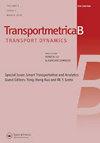使用机器学习技术对电动汽车驾驶员充电行为模型进行参数调整
IF 3.4
2区 工程技术
Q2 TRANSPORTATION
引用次数: 0
摘要
本文章由计算机程序翻译,如有差异,请以英文原文为准。
Parameter tuning of EV drivers' charging behavioural model using machine learning techniques
The charging behaviour of electric vehicle (EV) drivers significantly influences planning of the future deployment of public charging stations (CSs). Thus, identifying the EV drivers' charging behaviour plays a major role in CS management and development. In this regard, some parametric behavioural Markov models (BMMs) introduced in the literature have acceptable performance with tuned parameters. Enjoying the benefits of these BMMs needs accurate and feasible parameter tuning. To address this challenge, we propose a machine learning-based method to tune the parameters of such a BMM dynamically. A Deep Q-Network (DQN) algorithm is an appropriate solution in which the reward function is designed based on the statistical resemblance between the EV plug-in and charging times derived from CS simulation with their equivalents derived from the CS charging data. The evaluation results based on the real charging data demonstrate the convergence of the proposed algorithm and validate the accuracy of the adapted behavioural parameters. Accurately adapting the model parameters is an essential prerequisite for designing a system that identifies the EV drivers' behaviour. This novel system helps control the CS congestion and predict the CS requirements when the EV population grows in the future.
求助全文
通过发布文献求助,成功后即可免费获取论文全文。
去求助
来源期刊

Transportmetrica B-Transport Dynamics
TRANSPORTATION SCIENCE & TECHNOLOGY-
CiteScore
5.00
自引率
21.40%
发文量
53
期刊介绍:
Transportmetrica B is an international journal that aims to bring together contributions of advanced research in understanding and practical experience in handling the dynamic aspects of transport systems and behavior, and hence the sub-title is set as “Transport Dynamics”.
Transport dynamics can be considered from various scales and scopes ranging from dynamics in traffic flow, travel behavior (e.g. learning process), logistics, transport policy, to traffic control. Thus, the journal welcomes research papers that address transport dynamics from a broad perspective, ranging from theoretical studies to empirical analysis of transport systems or behavior based on actual data.
The scope of Transportmetrica B includes, but is not limited to, the following: dynamic traffic assignment, dynamic transit assignment, dynamic activity-based modeling, applications of system dynamics in transport planning, logistics planning and optimization, traffic flow analysis, dynamic programming in transport modeling and optimization, traffic control, land-use and transport dynamics, day-to-day learning process (model and behavioral studies), time-series analysis of transport data and demand, traffic emission modeling, time-dependent transport policy analysis, transportation network reliability and vulnerability, simulation of traffic system and travel behavior, longitudinal analysis of traveler behavior, etc.
 求助内容:
求助内容: 应助结果提醒方式:
应助结果提醒方式:


